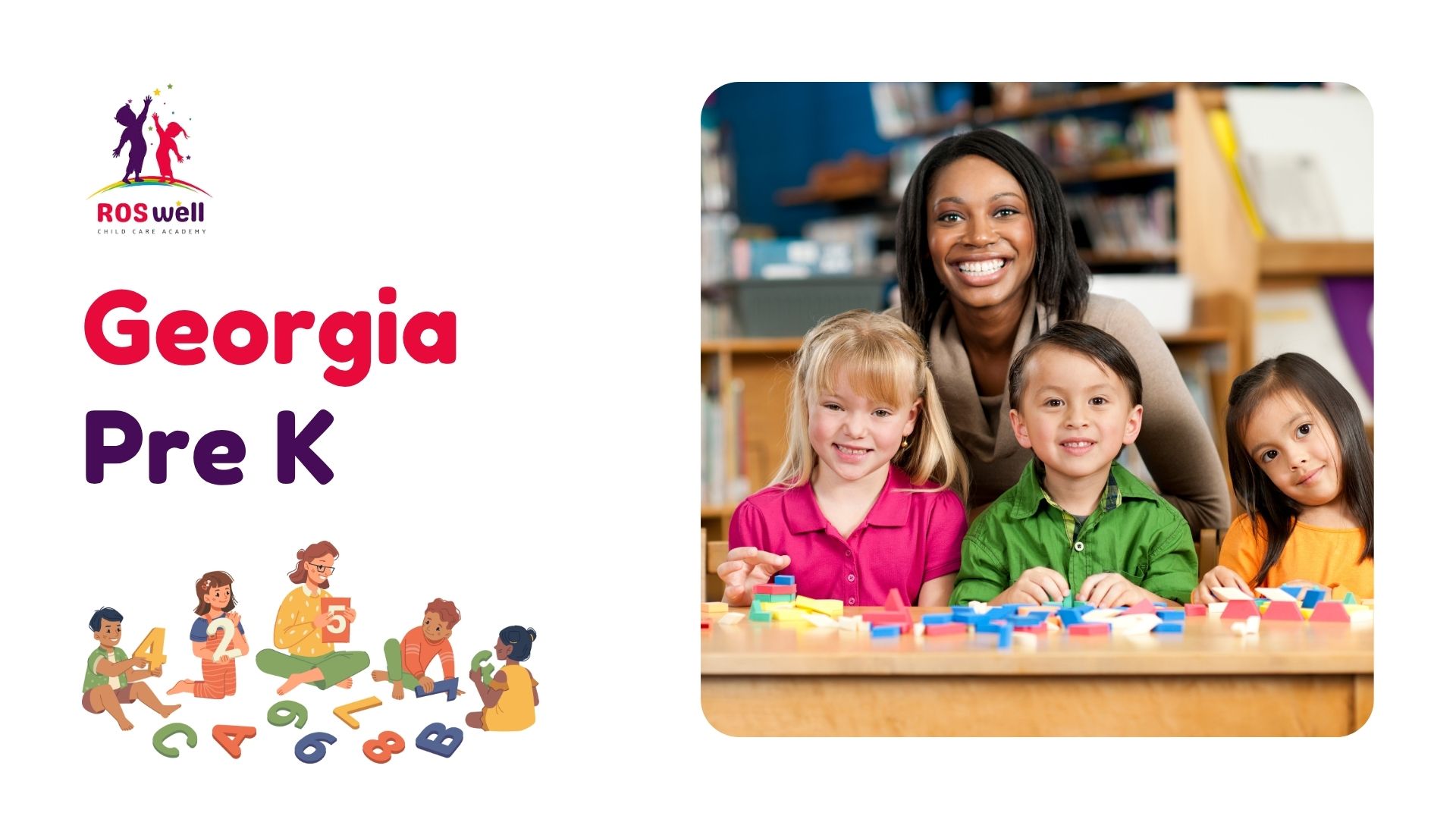- Email: roswellchildcareacademy@gmail.com
- Phone: 470-282-1521

Preparing a child for kindergarten is a critical part of their intellectual and emotional development. Perhaps the best way to ensure that children are ready for this experience is through Georgia Pre K. This state program has been shaping the education of four-year-olds in Georgia for decades. Through the integration of programmed learning, socialization, and play-based learning, Georgia Pre K provides a foundation for long-term success.
Georgia Preschool is a lottery-funded pre-school educational program whose mandate is to give four-year-olds access to high-quality pre-school education. The program is meant to prepare children for school and focuses on early numeracy, literacy, social-emotional development, and physical preparedness. Students in the program receive a curriculum derived from the Georgia Early Learning and Development Standards (GELDS).
Key Characteristics of Georgia Pre K
Language is presented to Georgia Preschool children in the form of books, stories, and regular conversations. Vocabulary building, phonemic awareness, and letter recognition are the activities employed to introduce language. These are blocks to reading fluency and understanding in kindergarten and beyond. Visual aids, songs, rhymes, and guided reading sessions are employed by teachers to facilitate children to acquire the fundamental literacy skills.
The program includes math play and manipulative activities to instruct number recognition, patterns, sorting, and basic problem-solving. This foundation math gives children confidence when they begin kindergarten-level math. Group activities like counting games and manipulatives also help children build logic and reasoning.
In Georgia Pre K, kids learn to take responsibility for routines, make decisions, and be responsible for their own items. They learn these little things that contribute to independence, a key to kindergarten success. Time management is acquired by following schedules planned in advance that are a simulation of kindergarten.
Children are also trained to acquire important interpersonal skills such as sharing, turn-taking, and conflict resolution. These are not only necessary for school but for life as well. Good behavior is modeled by teachers, peer relations are fostered, and children are helped to label and express feelings in a positive way.
Georgia Pre K uses a play-based learning system that keeps young children engaged as they learn critical thinking and problem-solving skills. Play, music, and collaboration enable children to learn and reinforce what they already understand.
Georgia Preschool classroom environment blends play with structured academic teaching as a way of making learning both enjoyable and effective. Classroom centers allow students to make decisions as well as re-inforce academic concepts in the classroom within a playful environment.
Movement is incorporated into the curriculum. Dance, outdoor play, and fine motor activities such as cutting, drawing, and puzzles are incorporated into the daily routine. They help children build hand-eye coordination, balance, and imagination.
Art and music are utilized to enhance imagination and self-expression. Painting, creating, or rhythm exercises are all critical components of a well-rounded education.
Parents are the most important factor to be involved in reinforcing what is learned in school. Georgia Preschool program promotes strong communication between family and teachers by means of regular updates, meetings, and opportunities for involvement. Parents are encouraged to join in classroom activities, visit workshops, and reinforce learning at home by reading as well as educational games.
Georgia Pre K students are already accustomed to the classroom routine, group environment, and formal instruction. This facilitates an easier transition from pre k to kindergarten for both the student and parent. They’re less stressed, more flexible, and more prepared for full-day routines.
When they graduate from Georgia Pre K, they are usually more confident in what they can do, concentrate better, and are more eager to learn—abilities that are essential to kindergarten and beyond success. The teachers comment that students who have finished the program are stronger academically and socially.
As the demand for early education grows, most daycare centers now offer the Georgia Preschool program. The centers blend old-fashioned childcare with formalized early education, offering convenience and consistency to parents. Having your child attend a daycare center that offers the program can ensure that your child receives the loving attention and educational preparation that they need.
In the final phases of kindergarten readiness, a daycare center can be a valuable bridge between school and home. With familiar caregivers and structured education, children learn effectively in an environment that fosters emotional and intellectual growth.
Georgia Pre K is not only a preschool program but a critical stepping stone to preparing students to thrive in an educational career. By incorporating academic learning, socialization, and play, it prepares the child with the abilities and confidence needed to succeed in kindergarten and beyond. By selecting the optimum provider—either through a public school or a certified daycare facility—parents are investing in their child’s future success.
The children must be four years old on or before September 1 of the school year and must be Georgia residents.
Yes. The scheme is funded by the Georgia Lottery for Education. Some providers will, however, charge additional for wraparound care outside the core hours.
You can apply through schools and providers who participate. Most private centers and public schools have Georgia Pre K. You should apply early because there are few available spots.
Look for state-licensed teachers, a clean and hygienic environment, an engaging curriculum, and positive parent-teacher relationships. A visit to the classroom and observation of a session can be helpful.
Comments are closed